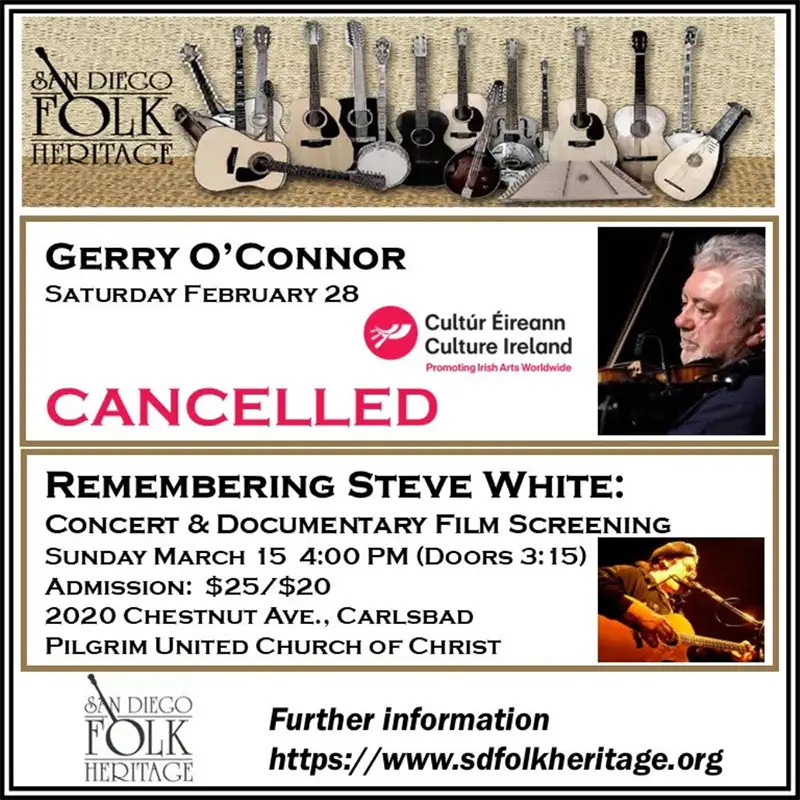Tales From The Road
Loudon Wainwright III Plays AMSD for Laughs

Loudon Wainwright III
He’s an artist who appeared on the folk scene in the Northeastern folk clubs in the late 1960s, initially considered one of several “new Dylans,” and signed to a recording contract. Parts of six decades later, Loudon Wainwright III is still touring and recording, with a catalog that now includes over two dozen albums spanning from 1970 to 2014. He has written songs covered by many top roots artists and received recognition that has included a Grammy award and nominations for two others. Wainwright’s talents extend to the stage and screen as well: as an actor he has appeared in many films and TV productions, from the 1970’s TV sitcom M*A*S*H to more recent appearances on the TV series Parks and Recreation and Person of Interest. His endearing stage persona and biting wit have made him a longtime concert favorite, and he will be appearing here in San Diego this month
His story isn’t one of those rags-to-riches tales. Born in 1946, he’s a direct descendant of Peter Stuyvesant, the one-legged 17th-century Dutch colonial governor who, among other things, built the wall, in Manhattan, that Wall Street is named for as well as the canal that became Broad Street and Broadway. Wainwright’s father was an editor and writer for Life magazine and he grew up in comfortable Westchester County north of New York City. His dad wasn’t a pro musician but played piano and wrote songs, exposing him to music as a child, and his younger sister Sloan would also pursue a musical career. In his teen years, while at St Andrews School (where Dead Poets Society would be filmed), he played guitar and started getting into folk music. He took some classes at Carnegie Mellon University, including acting, before dropping out and working in a boatyard, where he wrote his first song about a lobsterman friend. Soon, he was making the rounds in New York and Boston folk clubs, playing guitar and singing his compositions. After developing a following based on his offbeat wit, he was signed to Atlantic Records (his first of more than a dozen labels) in 1970 and released a series of albums, starting with, no surprise, Album I.
Wainwright’s witty music never seemed to take him or itself too seriously, his early efforts are described by AllMusic.com’s William Ruhlmann as “humorous and nakedly honest autobiographical songs.” His Album III included a single that was a top 20 pop hit, the funny novelty song “Dead Skunk (in the Middle of the Road).” Though he wasn’t a big record-seller, he was funny, engaging, a concert draw, and a sort of cult figure. A perennial favorite of critics, Rolling Stone described his “self-lacerating humor, deadpan irony, and often deliberate tastelessness complemented by a comic rubber-faced stage presence.”
He married singer Kate McGarrigle in 1971 and their children Rufus and Martha both became folk performers. His music, meanwhile, was being covered by not only McGarrigle and Rufus but other artists, including Johnny Cash, Earl Scruggs, Bonnie Raitt, and Mose Allison. He was also branching out into acting, appearing in an off-Broadway play and several episodes of the TV series M*A*S*H, in a featured role as a singing surgeon in 1975. A few albums followed that were more and more focused on cynical and self-depreciating wit, including a couple that feature him singing with a full rock band, well chronicled on his 1978 tune, “Watch Me Rock, I’m Over Thirty,” from Final Exam. The albums weren’t successful, and neither was his marriage to McGarrigle, as they divorced in 1977.
In the 1980s he temporarily relocated to England, where he was getting more notice at that time. He released two records co-produced by Richard Thompson, I’m Alright (1985) and More Love Songs (1986). Both were nominated for Grammy awards, and contain such strong tracks as “Cardboard Boxes” and “Hard Day on the Planet.” Soon, he was back in the States for a series of major-label albums that may represent the apex of his recorded oeuvre.
History, from 1992, mixes the funny and the serious — not a big surprise given the passing of Wainwright’s father, memorialized in the song “Sometimes I Forget.” Citing his father’s passing as a major influence on the record, as well as the struggle with his own son, he also adopted a song originally written by his dad to wrap the album, “Handful of Dust.” Another song, “Hitting You,” was dedicated to his daughter Martha, a poignant study of his regret about an occasion of slapping her too hard once when she was a child, foretelling a difficult future relationship. Wainwright also wrote about his own roots, tongue in cheek, with “Talking New Bob Dylan.” The album effectively switched from autobiographical tunes to ones that observe others, as well as mixing rock beats with ballads. A well-circulated tale concerns the argument that Bruce Springsteen and Bob Geldof got into in front of journalists after the album’s release; both agreed it was the best album of the year, but there was only one copy in the room — and both wanted it. AllMusic.com’s Jim Newsom calls History “his masterpiece.” He followed up in early 1993 with a live album that also rates as one his best ever: Career Moves. Here he performed 22 of his songs to that point, including “Five Years Old,” “Thanksgiving,” and “The Man Who Couldn’t Cry.” The set mixed his abilities as a satirist and serious balladeer with a strength in self-reflection.
More solid Wainwright efforts followed in the ’90s, many based on his tempestuous family life, as he had moved in and out of a relationship with singer Suzzy Roche; their daughter is Lucy Wainwright Roche, who is yet another musician. His lyrics were sharp as ever, on songs like “So Damn Happy” and “The World” from 1998’s Little Ship, named for a song about his stormy personal life in this world, which on “The World” is “a dirty old crappy old shitty old terrible joke.” He wrote many songs for National Public Radio late in the decade, taking shots at such wide-open targets as OJ Simpson, Tonya Harding, Y2K, and the politicians of the time. The latter got some Wainwright attention with his special twist, in “Inaugural Blues” from 1999’s Social Studies: “Fleetwood Mac got back together/ In separate limos on reunion day… In D.C., bells ring, there are fireworks/ On TV, we see Baghdad bombed.”
With the new century, Wainwright’s acting appearances increased in number, with parts in several movies, including 28 Days, Big Fish, The Aviator, The 40-Year-Old Virgin, and Knocked Up. The latter 2007 comedy by Judd Apatow also gave Wainwright an opportunity to compose, with Joe Henry, a film soundtrack. The result was Strange Weirdos: Music From and Inspired by the Film Knocked Up. This collaboration worked amazingly well, as new songs were added to reworked old songs, a couple of instrumentals, and covers of others. All of it was performed by a crack band that featured Van Dyke Parks and Richard Thompson. His music here tended to be less bitter in tone than some of his previous work, revealing an older, mellower Loudon with a sense of vulnerability that made the love ballads like “You Can’t Fail Me Now” work especially well.
In 2009, Wainwright followed up the soundtrack with another ambitious undertaking, High Wide & Handsome: The Charlie Poole Project. This double album covered old and traditional acoustic country and blues tunes — and new ones that sounded old — all drawn from the career of a little-known country singer/banjo picker who also was known for his boozing and hard living during the first couple of decades of the 20th Century. The project gave Wainwright a chance to revisit the music of the period, which he did with surprising effectiveness on tunes that include “The Deal” and “Mother’s Farewell Kiss,” originally recorded by Poole back in the day. Wainwright put his own brand on the old tunes while retaining the vintage feel with a depression-era country twang in his vocals that sounded just right. He wrote the title song as well as others with Dick Connette, and the songs here included opportunities to sing with the Roches on background vocals (“Moving Day”), as well as with Rufus and Martha on “Old and In the Way.” The tribute disc was considered a triumph, scoring both belated recognition for Poole decades after his passing, and winning the 2010 Grammy for Best Traditional Folk Album.
Wainwright’s most recent releases seemed to be the work of a man in his sixties looking at his life, family, and sunset years. On 2012’s Older Than My Old Man Now, the autobiographical, barbed sense of humor was intact on “My Meds,” and “I Remember Sex,” while elsewhere the focus was on his musical clan, with Rufus appearing on a track, Lucy on another, and Martha on “Over the Hill,” a collaborative writing effort by Loudon and his late ex-wife McGarrigle. Last year, he released his 26th album, Haven’t Got the Blues (Yet). This disc showed Wainwright’s ability to spin a catchy folk tale was undiminished, “Harlan County,” as was the acid wit, in “The Morgue,” (about a visit to see his ex’s dead body, to tell her off) and “I’ll Be Killing You This Christmas.” The latter song squarely targeted the gun-mad US society on the heels of the Sandy Hook slaughter — especially the NRA — with humor that is darker than black: “Though there is no way that you’ll miss this/ A Bushmaster’s on my wish list/ My right to bear arms you cannot deny.”
Wainwright is sure to bring along plenty of topical and personal song stories to his local performance, which is sure to be a crowd-pleasing evening. He can laugh at himself, and society, but sometimes the jokes have a deeper meaning.
See Loudon Wainwright III on Sunday, September 27, 7:30pm, at AMSD Concerts, Sweetwater Union High School, 2900 Highland Avenue, National City.








